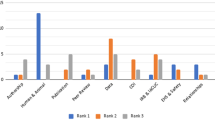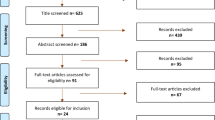Abstract
Although much of the focus on responsible conduct in research has been defined by courses or online training, it is generally understood that this is less important than what happens in the research environment. On the assumption that providing faculty with tools and resources to address the ethical dimensions of the practice of research would be useful, a new workshop was convened ten times across seven academic institutions and at the annual meeting of a professional society. Workshops were attended by 91 faculty, 71 (78% response rate) of whom completed evaluations strongly supportive of the value of the workshop. Surveys of trainees identified by the faculty allowed for invitations to complete an online survey before and 6 months after the workshops, respectively resulting in response rates of 43 and 51%. Faculty and trainees were highly supportive of the feasibility, relevance, and effectiveness of the implementation by the faculty of one or more of the five strategies featured in the workshop. However, surprisingly over 70% of the trainees reported use of one or more of those strategies prior to faculty participation in the workshops. In sum, the workshops for faculty were successful, and the proposed strategies were deemed of value, but it is likely that the faculty voluntarily choosing to participate in these workshops were perhaps not surprisingly faculty who are already engaging in some of these strategies. This model is likely a useful adjunct to encouraging a culture of ethics, but it is not by itself sufficient to do so.

Similar content being viewed by others
References
Alberts, B., Kirschner, M. W., Tilghman, S., & Varmus, H. (2014). Rescuing US biomedical research from its systemic flaws. Proceedings of the National Academy of Sciences, 111(16), 5773–5777.
Anderson, M. S. (2011). Research misconduct and misbehavior. In T. Bertram Gallant (Ed.), Creating the ethical academy: A systems approach to understanding misconduct and empowering change in higher education (pp. 83–96). New York: Routledge.
Anderson, M. S., Horn, A. S., Risbey, K. R., Ronning, E. A., DeVries, R., & Martinson, B. C. A. (2007). What do mentoring and training in the responsible conduct of research have to do with scientists’ misbehavior? Findings from a national survey of NIH funded scientists. Academic Medicine, 82(9), 853–860.
Anderson, M. S., & Louis, K. S. (1994). The graduate student experience and subscription to the norms of science. Research in Higher Education, 35, 273–299.
Antes, A. L., Murphy, S. T., Waples, E. P., Mumford, M. D., Brown, R. P., Connelly, S., & Devenport, L. D. (2009). A meta-analysis of ethics instruction effectiveness in the sciences. Ethics and Behavior, 19(5), 379–402.
Artino, A. R. & Brown, S. W. (2009). Ethics in educational research: A comparative analysis of graduate student and faculty beliefs. College Student Journal 43(2). Project Innovation (Alabama). http://www.freepatentsonline.com/article/College-Student-Journal/201608576.html.
Brown, S., & Kalichman, M. W. (1998). Effects of training in the responsible conduct of research: A survey of graduate students in experimental sciences. Science and Engineering Ethics, 4(4), 487–498.
Eastwood, S., Derish, P., Leash, E., & Ordway, S. (1996). Ethical issues in biomedical research: Perceptions and practices of postdoctoral research fellows responding to a survey. Science and Engineering Ethics, 2, 89–114.
Faden, R. R., Kass, N. E., Klag, M. J., & Krag, S. S. (2002). On the importance of research ethics and mentoring. The American Journal of Bioethics, 2(4), 50–51.
Fryer-Edwards, K. (2002). Addressing the hidden curriculum in scientific research. American Journal of Bioethics, 2(4), 58–59.
Hartmann, D., & Mullins, M. (2003). Teaching research ethics: An institutional change model. Dave Hartmann and Megan Mullins, June 2003 (Western Michigan University, unpublished). Cited by Langlais (2006).
Heitman, E., Salis, P. J., & Bulger, R. E. (2001). Teaching ethics in biomedical science: Effects on moral reasoning skills. In Proceedings of the First ORI Research Conference on Research Integrity (pp. 195–202).
Institute of Medicine. (2002). Chapter 3: The research environment and its impact on integrity in research. Integrity in scientific research: Creating an environment that promotes responsible conduct. https://www.nap.edu/catalog/10430/integrity-in-scientific-research-creating-an-environment-that-promotes-responsible.
Kalichman, M. (2013a). A brief history of RCR education. Accountability in Research, 20(5–6), 380–394.
Kalichman, M. (2013b). Why teach research ethics? In Proceedings from National Academy of Engineering Workshop on Practical Guidance on Science and Engineering Ethics Education (pp. 5–16).
Kalichman, M. (2014). A modest proposal to move RCR education out of the classroom and into research. Journal of Microbiology and Biology Education, 15(2), 93–95.
Kalichman, M. W. (2011). The problem of research misconduct, EthicsCORE, National Professional and Research Ethics Portal. http://nationalethicscenter.org/resources/220.
Kalichman, M. W., & Plemmons, D. (2007). Reported goals for responsible conduct of research courses. Academic Medicine, 82(9), 846–851.
Langlais, P. (2006). Ethics for the next generation. In 16th Annual Teaching Renewal Conference, 2/23/06, University of Missouri at Columbia. https://www.academia.edu/16969148/Ethics_for_the_next_generation.
Langlais, P. J., & Bent, B. J. (2013). Individual and organizational predictors of the ethicality of graduate students’ responses to research integrity issues. Science and Engineering Ethics, 20, 897. doi:10.1007/s1194801394712.
Mulhearn, T. J., Steele, L. M., Watts, L. L., Medeiros, K. E., Mumford, M. D., & Connelly, S. (2016). Review of instructional approaches in ethics education. Science and Engineering Ethics. doi:10.1007/s11948-016-9803-0.
National Academies of Sciences, Engineering, and Medicine. (2017). Fostering integrity in research. Washington, DC: The National Academies Press. doi:10.17226/21896.
NIFA/USDA (2013). Responsible and ethical conduct of research. Article 7 Other Requirements (not specified elsewhere). Agency-Specific Terms and Conditions, National Institute of Food and Agriculture U.S. Department of Agriculture Research Terms and Conditions. https://research.ufl.edu/compliance/pdf/nifa_213.pdf.
NIH (1989). Requirement for programs on the responsible conduct of research in national research service award institutional training programs. NIH Guide for Grants and Contracts, 18(45), 1. http://grants.nih.gov/grants/guide/historical/1989_12_22_Vol_18_No_45.pdf.
NIH (2009). Update on the requirement for instruction in the responsible conduct of research. Release date: November 24, 2009. Notice: OD-10-019. http://grants.nih.gov/grants/guide/notice-files/NOT-OD-10-019.html.
NSF (2009). Responsible conduct of research. Part II—award and administration guidelines. In Proposal and Award policies and procedures guide (pp. IV–3). http://www.nsf.gov/pubs/policydocs/pappguide/nsf10_1/nsf10_1.pdf.
Peiffer, A. M., Laurenti, P. J., & Hugenschmidt, C. E. (2008). Fostering a culture of responsible lab conduct. Science, 322, 1186. doi:10.1126/science.322.5905.1186b.
Phillips, T., Nestor, F., Beach, G., & Heitman, E. (2017). America COMPETES at 5 years: An analysis of research-intensive universities’ RCR training plans. Science and Engineering Ethics. doi:10.1007/s11948-017-9883-5. (Epub ahead of print).
Plemmons, D. K., & Kalichman, M. (2017). Mentoring for responsible research: The creation of a curriculum for faculty to teach RCR in the research environment. Science and Engineering Ethics. doi:10.1007/s11948-017-9897-z. (Epub ahead of print).
Schmaling, K. B., & Blume, A. W. (2009). Ethics instruction increases graduate students’ responsible conduct of research knowledge but not moral reasoning. Accountability in Research, 16(5), 268–283. doi:10.1080/08989620903190323.
Steneck, N. H., & Bulger, R. E. (2007). The history, purpose, and future of instruction in the responsible conduct of research. Academic Medicine, 82(9), 829–834.
Swazey, J. P., & Anderson, M. S. (1996). Mentors, advisors, and role models in graduate and professional education. Washington, DC: Association of Academic Health Centers.
Watts, L. L., Medeiros, K. E., Mulhearn, T. J., Steele, L. M., Connelly, S., & Mumford, M. D. (2016). Are ethics training programs improving? A metaanalytic review of past and present ethics instruction in the sciences. Ethics and Behavior. doi:10.1080/10508422.2016.1182025.
Whitbeck, C. (2001). Group mentoring to foster the responsible conduct of research. Science and Engineering Ethics, 7, 541–558.
Acknowledgements
The project reported here was conducted with support from a National Science Foundation (NSF) funded project titled “Integrating Ethics Education: Capacity-Building Workshops for Science and Engineering Faculty” (NSF Grant #1135358). The expert panelists who were part of the consensus conference to produce this workshop curriculum included: John Ahearne (Sigma Xi), Melissa Anderson (University of Minnesota), Mark Appelbaum (UC San Diego), Yuchen Cao (UC San Diego), Michael Davis (Illinois Institute of Technology), Chris DeBoever (UC San Diego), Mark Frankel (AAAS), C.K. Gunsalus (University of Illinois at Urbana-Champaign), Elizabeth Heitman (Vanderbilt), Joseph Herkert (Arizona State University), Rachelle Hollander (National Academy of Engineering), Crane Huang (UC San Diego), Deborah Johnson (University of Virginia), Nancy Jones (National Institute of Allergy and Infectious Diseases, NIH, DHHS), Michael Kalichman (UC San Diego), Nelson Kiang (Harvard Medical School), Philip Langlais (Old Dominion University), Francis Macrina (Virginia Commonwealth University), Brian Martinson (HealthPartners Research Foundation), Michael Mumford (University of Oklahoma), Ken Pimple (Indiana University), Dena Plemmons (UC San Diego), Patrick Wu (UC San Diego), and Guangming Zheng (UC San Diego).
Author information
Authors and Affiliations
Corresponding author
Appendices
Appendix 1
Your Anonymous Evaluation of this Workshop will be Invaluable for Planning for Future Versions of this Type of Program
Using a scale of 1–5 (1 = very low, 5 = very high), please rate the extent to which today's workshop helped you to meet the stated objectives for your particular research environment, which include being able to:
1. | Articulate rationales for integrating research ethics education | — |
2. | List and describe ethics topics suitable and useful to be addressed | — |
3. | List and describe approaches for integrating research ethics education | — |
4. | Design one or more activities to introduce research ethics | — |
5. | Using a scale of 1 to 5 (1=very low, 5=very high), how would you score the overall value of this workshop? | — |
6. | How, if at all, have your perceptions or understanding been changed by participating in today’s workshop? | |
7. | How would you describe the value of this workshop to your plans for teaching or promoting research ethics? | |
8. | What changes would you recommend to help improve future versions of this workshop? | |
9. | Please use the space below or the back of this page if you have any additional comments or suggestions about future workshops on this topic: |
Appendix 2






Appendix 3





Rights and permissions
About this article
Cite this article
Kalichman, M.W., Plemmons, D.K. Intervention to Promote Responsible Conduct of Research Mentoring. Sci Eng Ethics 24, 699–725 (2018). https://doi.org/10.1007/s11948-017-9929-8
Received:
Accepted:
Published:
Issue Date:
DOI: https://doi.org/10.1007/s11948-017-9929-8




